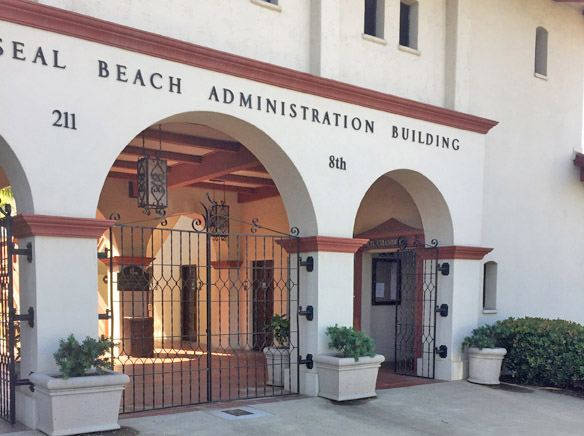Part two of an ongoing series.
The City Charter says the City Council can issue subpoenas.
Most people don’t know that.
This is the second in a series about the Seal Beach City Charter.
Today’s topic: The City Council.
Let’s start with the council’s power to order people to show up.
“Each member of the City Council shall have the power to administer oaths and affirmations in any investigation or proceedings pending before the City Council. The City Council shall have the power and authority to compel the attendance of witnesses, to examine them under oath, and to compel the production of evidence before it. Subpoenas shall be issued in the name of the City attested by the City Clerk. Disobedience of such subpoenas, or the refusal to testify (except as to privileged matters), shall constitute a misdemeanor, and shall be punishable in the same manner as violations of this Charter are punishable,” according to Article IV, Section 410.
The council itself
The Charter requires five council members, one from each district, according to Article IV, Section 400.
Yes, you have to live in Seal Beach to run for council. No, you don’t have to own real estate to be on the council. If that were the case, few Leisure World residents would be allowed to represent Leisure World on the council. Leisure World covers two council districts.
Section 402 of the Charter says council members will be paid according to the California Government Code. According to the Controller’s Office, Seal Beach council members were paid $7,200 in wages in the fiscal year ending June 30, 2023.
“A vacancy in any elective office shall be filled in accordance with state law,” according to Article IV, Section 403.
A city can call a special election or appoint a council member. An upstairs neighbor of mine once applied to be appointed to the council. I was relieved when the neighbor didn’t get the position.
Article IV, Section 422, of the Charter limits council members to two consecutive terms.
Limits on authority
“Neither the City Council nor any of its members shall interfere with the execution by the City Manager of his/her powers and duties; or order, directly or indirectly, the appointment by the City Manager or by any of the department heads in the administrative service of the City, of any person to an office or employment or removal therefrom,” according to Article IV, Section 406.
Except for asking questions, council members will deal with the city manager only “and neither the City Council nor any member thereof shall give orders to any subordinate of the City Manager, either publicly or privately,” according to Article IV, Section 406.
Free speech
“No citizen shall be denied the right, personally or through counsel, to present grievances at any regular meeting of the Council, or offer suggestions for the betterment of municipal affairs subject always to the rules of the City Council governing the conduct of Council meetings,” according to Article IV, Section 411. However, anyone who disrupts a meeting may be kicked out, according to Article IV, Section 410, of the Charter.
Meetings
“The City Council shall hold regular meetings at least once each month in accordance with the Brown Act (California Government Code Section 54950 et seq.), as such statute now exists or may hereafter be amended, at such times, as it shall fix by ordinance or resolution. The City Council may adjourn or re-adjourn any meeting and may call special meetings, in accordance with the Brown Act. If at any time any regular meeting falls on a holiday, such regular meeting may be held thereafter prior to the next regular meeting,” according to Article IV, Section 407.
Council meetings take place in Council Chambers, though the Charter doesn’t specify that location.
“A majority of the members of the City Council shall constitute a quorum to do business, but a less number may adjourn from time to time,” according to Article IV, Section 410.
If only two council members show up, the meeting will be adjourned.
“Notice of a meeting adjourned by less than a quorum or by the Clerk shall be given by the Clerk or may be waived by consent in the same manner as specified in this Charter for the giving or waiving of notice of special meetings of the City Council, but need not specify the matters to be acted upon,” according to Article IV, Section 410.
Money
The council can only order the payment of money at regular meetings, according to Article IV, Section 412.
Contracts
The Charter says Seal Beach cannot be bound by contracts unless they are approved by the City Council.
However, the council may delegate contract approval to the city manager,” according to Article IV, Section 420. In fact, the council did so years ago.
Ordinances
An ordinance (city law) can’t take effect within five days after the council introduces the ordinance, according to Article IV, Section 412.
The Charter doesn’t use the term “first reading,” but that’s another phrase for introducing an ordinance. With a few exceptions, a first reading is followed by a second reading that is also known as adoption.
“In the event that any ordinance is altered after its introduction, the same shall not be finally adopted except at a regular or adjourned regular meeting held not less than five (5) days after the date upon which such ordinance was so altered,” according to Article IV, Section 412
Typos don’t count as alterations, according to Section 412.
Most ordinances only require a simple majority of three votes, according to Section 412.
With a few exceptions, an ordinances goes into effect 30 days after it is adopted, according to Article IV, Section 416.





